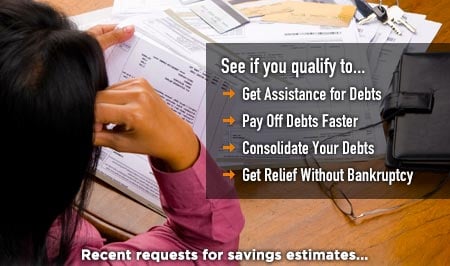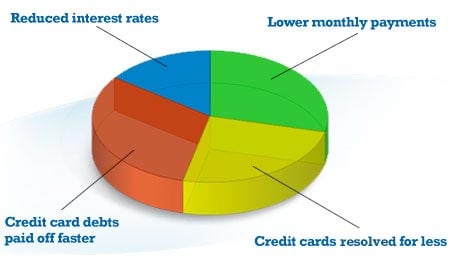
Consolidate My Debt
If, like many consumers living in New York or elsewhere, you are struggling with high-interest debts spread across multiple credit cards, you might be asking yourself, "How much could I potentially save if I consolidate my debts?" Consolidating your debts via a debt consolidation program is certainly a popular option among many consumers who are looking to get relief from their credit card debts as well as unsecured debts like utilities, department store charges, or even medical bills.
Also known as credit counseling or a debt management plan (DMP), debt consolidation allows consumers to combine their high-interest debts into a single and more manageable payment plan made to a credit counseling agency. The goal is, with a more structured and more affordable repayment plan, consumers in debt can dedicate more of their payment into paying the principal of the debts versus just the interest, reducing debts at a more accelerated pace.
Debt consolidation, however, is not the only option available for consumers who need debt relief. Another popular debt relief option is debt settlement, or debt negotiation. What debt settlement typically allows is for consumers to negotiate with their individual creditors in hopes of substantially reducing the amount of what they owe. Today, both methods -- debt consolidation and debt settlement -- are popular alternatives to bankruptcy, which has a more severe and longer lasting impact to one's credit score.
To see if you qualify for debt relief, request your free debt relief analysis and savings estimate today. Start now.
An Easier-to-Manage Payment Plan
For many consumers, high credit card debt is not always the result of reckless spending or impulse buys. In this tight economy, many consumers might have fallen into hard times as a result of unexpected financial hardships -- like unemployment or unexpected medical bills. As such, many of these consumers have been forced to use their credit cards for daily essentials like food and utilities. As mentioned earlier, one proven debt relief option is debt consolidation, or a debt management plan (DMP). The goal of a debt consolidation plan is to "consolidate," or combine, your unsecured debts into a single, more manageable and more structured monthly payment made to a credit counseling agency.
Coordinated by credit counselors, the debt consolidation process typically begins with a review of your finances, outstanding debts, and other assets. This process allows credit counselors to fully understand your debt situation, the interest rates that you are paying, and the balances on your credit cards. Then, when they have a clear picture of your finances, they typically submit proposals to creditors, on your behalf, requesting lower interest rates and the waiving of late fees and penalties. Creditors that accept the proposals are then added to the debt management plan, and receive payment through the credit counseling agency.
Debt Consolidation Savings
For many consumers who have the discipline to monitor their budget and stop using their credit cards for most of their purchases, debt consolidation can likely help them get on a path towards reducing their debts and potentially lead to savings. Keep in mind, however, that while it is the credit counselor's responsibility to request and arrange a more lenient repayment plan, it remains your responsibility to ensure that you have the funds available in the account set up by the credit counseling agency.
In addition, make sure that you understand how much savings you can potentially get, every month, when you enroll in a debt consolidation program. Typically, your savings depend on several factors: the total amount of your debts, the current interest rates, and any late fees or penalties.
The bottom line is, if you are ready to pay down your credit card and unsecured debts, take the next step and find out what debt relief can do for you and your family. To explore your debt relief options, request a free debt relief analysis and savings estimate -- at no cost to you. Start today!





















